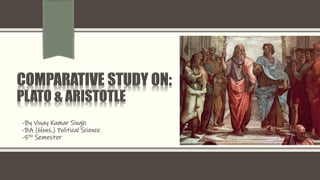
Plato and Aristotle: A Comparison of Their Political Thoughts
- 1. -By Vinay Kumar Singh -BA (Hons.) Political Science -5th Semester
- 2. ▪ Plato: was greatly influenced by the Peloponnesian War (between Athens & Spartans) and the death of Socrates (his master). Athens lost to Sparta, despite having a democratic government and his mentor (Socrates) was sentenced to death as he raised voice against the poor administration and corrupt rule. Socrates was ordered to drink poison as a punishment since he educated people to question the ill-doing of the government authorities. Due to this incident, Plato went in agony and started writing about the saying and beliefs of his master. ▪ Aristotle: was Plato's favorite student. Plato called him the "mind of the academy". However, Aristotle disagreed with his teacher on a variety of topics. Aristotle was not only the greatest disciple of Plato but also his greatest critique.
- 3. • Birth: 424 or 428 BC • Death: 348 BC (Aged – 80) • Athenian Philosopher • Student of Socrates •Teacher of Aristotle • Founded Plato’s Academy: first ever institution of higher learning in the Western countries. • Said to be the “First Utopian Philosopher” • Wrote – The Republic, The Laws and Statesman
- 4. • Father of Political Science • Greek Philosopher • Birth: 385 BC • Death: 323 BC (Aged – 62) • Student of Plato & teacher of Alexander the Great (Macedonian King) • Considered - Last man to know everything there was to be known in his time. • Founded Lyceum
- 6. • Aware of the instability in the politics and society of Greece. • Gave importance to law and justice in the State. • Stress on control of the population and says that low population a state is necessary for good administration. • Limited people of the state should participate in the politics of the state. • Considered State should be a moral and religious-based institution. The state is necessary for the development of an individual. • Opposed "Democracy". Plato even called democracy as "Mobocracy" as he was in an agony of the death of his master Socrates, who died in a democratic rule of Athens. • Gave importance to education & suggested a state-controlled education system. They believed that education is very important as it tells citizens about their rights and responsibilities towards the welfare of the state.
- 7. PLATO ▪ Used deductive methods of criticism. Plato formed general conclusions based on specific incidences. ▪ Plato used dialectal method. ▪ Radical ▪ Plato believes that only a Philosopher King can establish an ideal state ARISTOTLE ▪ Used Inductive methods of criticisms. Aristotle formed specific conclusions based on observing many common incidences ▪ Aristotle also discarded the oracular method & dialectal method. ▪ Conservative ▪ Aristotle criticizes the concept of Philosopher King.
- 8. PLATO ▪ Plato believes that citizens should always work for the State's well being and protection of their motherland. ▪ Plato believes in the communism of property and wives i.e. he believes that the Kings and soldiers can’t have private property or wife, No one allowed to identify a child as their own since it leads to nepotism. Plato calls family and private properties as the root cause of problems in society. ▪ Plato’s academy – was called Recreation Spot Academy. ARISTOTLE ▪ Aristotle argues that State was formed for the welfare of the people and State is a "community of communities“. ▪ Aristotle believes that property and families are necessary for the development of an individual and provide him with emotional support. ▪ Aristotle’s academy was called – Lyceum.
- 9. PLATO ▪ EXTREMISM: Plato was idealistic/perfectionist i.e. he goes into the extreme. ▪ POLITICS & ETHICS: Plato considers ethics as an integral part of Politics. ARISTOTLE ▪ GOLDEN MEAN: Aristotle believes in the middle-path/Golden mean i.e. he believed in moderation and not extremism. Eg. Golden mean concept. Aristotle further says that one should not sacrifice good for the sake of achieving best, because best is un- achievable. He believed in common sense rather than any specialized training for the philosophers. ▪ Aristotle separates the study of politics and ethics altogether.
- 10. PLATO ▪ STATE AS A FAMILY: Plato considers the state as a big family and the philosopher-king as the father of the family that has absolute authority over it. Like members of the family make sacrifices for each other, similarly, he expects citizens to make sacrifices in a state. ▪ More idealistic in his perspective. ▪ Plato's talks about philosopher-king who might turn out to be a despotic ruler due to the possession of absolute authority over the State. ARISTOTLE ▪ Aristotle criticized Plato on his understanding of the State. Aristotle differentiates between the authority of a father over children in a family with authority of masters over slaves & statesman over the citizen. He consolidates his point by saying that the state is not a family but a “family of families”. Thus, the laws dictating citizens shouldn’t be made by one. ▪ Aristotle was more pragmatic in his perspectives than Plato. ▪ Aristotle talks about the supremacy of the laws or rule of the law.